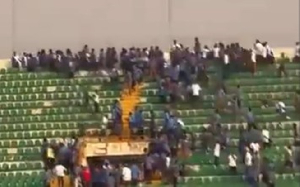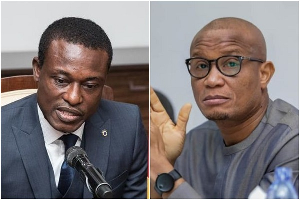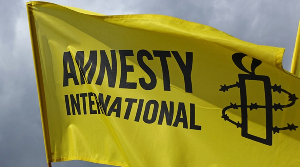By Michael J.K. Bokor, Ph.D.
E-mail: mjbokor@ilstu.edu
Part I
A warning: If the new NDC government does not take immediate steps to expose and punish public office holders who indulged in corrupt practices under the NPP administration, it will find it difficult to win more public sympathy and support. If it fears criticism about how it tackles this issue of corruption, it may gradually lose the goodwill that ushered it into office and find it difficult to convince Ghanaians that it can do anything satisfactory to effect the much-needed change in the conduct of public office holders.
I want to disagree with Dr. Kwesi Jonah, a political scientist, who is reported to have dropped hints that the promise by President John Mills to apply the rule of law during his rule means that he could be nursing a prosecution of former ministers of state. According to the news report (carried by JoyFM Online), Dr. Jonah is reported to have said that Prof. Mills could be under some influence from within his party to embark on some political witch-hunting.
His utterances are said to be in response to Prof. Mills’ acceptance speech during his inauguration in Accra on January 7 that he would not use his reign to prosecute former members of government although he would uphold the rule of law. Then, comes the nub:
“The President’s mention of ‘rule of law’ in his public addresses since the Electoral Commission (EC) declared him president-elect on Saturday, has stoked perceptions that he might make priority the prosecution of former ministers in the opposition party when he resumes office.”
What is wrong about President Mills’ declaration to let the “rule of law” guide the conduct of his government? Does allowing the “rule of law” to function necessarily mean “political witch-hunting”? What is “political witch-hunting” at all?
I will be the last person to accept any claim that taking decisive steps to look deeply into how Kufuor and his appointees conducted the affairs of state amounts to “political witch-hunting.” Having seen in eight years how the Kufuor-led NPP government went about conducting so-called “forensic investigations” into the activities of the first NDC government, and knowing very well the extent to which that government did politics with allegations of corruption and the eventual prosecution and jailing of those they thought were guilty of corrupt practices, they have already set the precedent for succeeding governments to follow.
The only difference between what the Kufuor government did and what a new government should do may be in the methods to be used and the scope that is covered. While the Kufuor government concentrated all its efforts on dealing with only their political opponents (beginning with Mallam Issah of the PNC and concentrating on only NDC functionaries even though allegations against his own appointees were rife), a new government should broaden the scope. But there is need for a starting point. And it must be with the functionaries of the out-gone NPP government. Immediate steps must be taken to begin digging deep into their conduct of affairs. Let no one come up with any gassy abstraction such as “witch-hunting” or “political vendetta,” which doesn’t mean anything to Ghanaians who have been robbed in broad daylight by these self-seeking politicians.
Such gassy abstractions are nothing but murky expressions meant to hide the truth, which our kind of democracy shouldn’t tolerate. They are meaningless “politicalese,” sad to say, which is an indirect way of telling Ghanaians to overlook the plain thievery going on public office; sadder still, it empowers those in public office to partake in corrupt practices with impunity because they know that they will be protected and not caught. This kind of “politicalese” will encourage them to continue inflicting damage on the system, thereby sustaining decades-old tradition of looting. The NDC functionaries (including President Mills himself) and most Ghanaians who voted for the NDC cited corruption and incompetence as factors that influenced the electoral choices that they made against the NPP. In effect, they were unhappy about how the NPP promised “Zero Tolerance for Corruption,” “Golden Age of Business” and “Positive Change,” among others, only to do what did not take the people out of their narrow circumstances. We all know the result of that sentiment.
I hesitate to say it but will do so if only what I am about to say will reinforce my stance. In January 2001, the first major assignment that the Kufuor-led NPP government gave the security agents was to go round the country to identify any property owned by any NDC functionary in their areas of coverage and to report their findings to “Accra.” This assignment, coming from Francis Poku’s National Security Secretariat (and carried out with Kufuor’s blessing), was part of the broad NPP agenda of exposing the NDC functionaries as people who had used their offices to grab property. By that exposure, the NPP government sought to win public sympathy and support in clamping down on the NDC.
Then, upon further investigations, such functionaries were to be subjected to the full rigours of the law. Whatever happened thereafter can best be summed up as a matter that necessitated the establishment of the Fast Track Courts. Even when the Supreme Court pronounced the illegality of such courts, the Kufuor government did not budge but took the ludicrous step by packing the Supreme Court and getting its stooges to reverse the initial decision. The prosecution and jailing of the NDC functionaries persisted. That of Nana Konadu Agyemang-Rawlings and the others is still pending. It was all in pursuit of the broad agenda of getting at functionaries of the NDC. It was as if the NPP government was possessed.
In effect, the law on causing financial loss to the state must be enforced through the Fast Track Courts. If using the security agents to go after these NDC functionaries on the mere suspicion of their illegally acquiring property and prosecuting or jailing them does not amount to political vendetta, then, what else is? Does the departure of the NPP government mean the abrogation of that law or the dissolution of the Fast Track Courts?
Where was this Kwesi Jonah at the time the NPP government was spending money and time going after functionaries of the NDC all in the name of proving their “guilt” by way of their new-found political terminology of “malfeasance”? This word was used across-the-board by Akufo Addo and the entire NPP political machinery as a buzzword to paint the NDC black. And they succeeded. They dismissed all calls to do things in a better manner. It beats my imagination why people who should know better turn round to say or do things that tend to create problems. To me, looking deep into the affairs of state under the NPP government in order to expose the true picture to Ghanaians is far from “political vendetta.”
Considering the fact that the Kufuor government had incurred the displeasure of the Ghanaian electorate over issues of corruption and the flaunting of ill-gotten wealth, the only means to set the records right is to look into what really happened within the corridors of power in terms of money-making ventures entered into by functionaries of the now-gone NPP government. The new NDC government must not freeze up before this problem, especially now that it has indicated doing things in a better manner. As we struggle to solve problems that hinder national development, we must be bold enough to take on those who deserve punishment for their wanton dissipation of public funds or for knowingly lining their pockets with what should have gone into the national coffers to be used for the benefit of the people. If that sounds like “political vendetta,” so be it.
Was Kwesi Jonah aware of the public resentment against the aspiring NPP Presidential Candidates who flaunted their wealth (money and expensive vehicles) about in the attempt to win their delegates’ favor? What did he say in response to open calls for these functionaries to tell Ghanaians the source of that wealth? Has he ever heard of what Arthur Kennedy complained about before he got himself smeared with the contract that he had from the Ministry of Health through the back-door? There are new opportunities to deal with corruption, which we must grab now. We must not be seized by the idea of a “political vendetta” to turn deaf ears to the complaints of corruption. It is not a minefield that we must cross gingerly. It is a canker that must be persistently looked for and eradicated. If we buy into all this talk of “political vendetta” and fail to take drastic action against those who abuse public office, we create a great irony: we are quick to shout against corruption while in the opposition but cannot do anything to tackle it when given the mandate. Is it because we will also indulge in it? How intriguing!!
To begin with, Prof. Mills must start from Kufuor’s Office of Accountability to furnish him with a comprehensive report on its activities. What did that Office do at all? From there, the NDC government must task all the public institutions capable of looking into matters of state to help in the digging into files and transactions under the NPP administration. People must be encouraged to provide evidence of wrongdoing so that the perpetrators can be exposed and punished. It is only then that people will begin to see the difference between this new government and its predecessors (Kufuor’s and Rawlings’). It is not too daunting a task.
At the end of the day, Prof. Mills will earn public sympathy, respect, and support instead of condemnation. Any talk of “political vendetta” should fly out of the window. Let it be said now that unlike Kufuor who declared “Zero Tolerance for Corruption” but tacitly promoted it, the new NDC government under Prof. Mills will clamp down on corruption without any fan fare or open public declaration. We need results.
Opinions of Sunday, 11 January 2009
Columnist: Bokor, Michael J. K.














